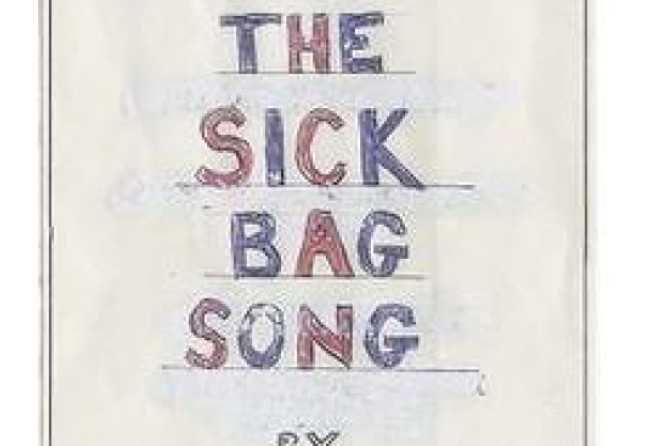
by Nick Cave
Canongate




Nick Cave has long operated in a particular rock 'n' roll tradition: that of the poete maudit, who lives outside or against society. Patti Smith, Jim Morrison, Lou Reed, Bob Dylan - these are some of the analogues to Cave's creative posture. And like all of them, he has not only made music but also written books.
Cave's first novel, And the Ass Saw the Angel, appeared in 1989; his second, The Death of Bunny Munro, came out in 2009. He has also published two collections of lyrics and occasional writings, and now an idiosyncratic diary of sorts, The Sick Bag Song, which traces the inner life of the 2014 North American tour by his band, the Bad Seeds.
The Sick Bag Song draws its title from the method of its composition: Cave wrote it longhand on air sickness bags while flying from city to city, Kansas City to Milwaukee to Minneapolis, and part of what it recounts is an endless sequence of hotel rooms and stages, the distance from home and family.
"I awake hanging from the ceiling in the Westin, Calgary, Southern Alberta," he writes in one sequence. "I spider down into my clothes and fling wide the window!"
Hyperbole, yes, although that is not what Cave has in mind here. Rather, he wants to evoke a state of statelessness, of rootlessness, of being lost in the middle of his life with nowhere, particularly, to turn.
"I carefully concoct a paste in a bowl and I paint my hair black," he writes in one of the book's most revealing passages. "… In the right eye,/ in the blue, is a little brown discolouration and the whites/ Are beginning to yellow. There is a lover spot on my right temple/ A spider-vein on my right nostril. The bathroom light is brutal./ I reposition my face so that I stop looking/ Like Kim Jong-un and start looking more like Johnny Cash."
This is no rock star posing - although there is some here and names dropped include Cash, Dylan and Bryan Ferry - but a kind of brutal explication of ageing, in a field where ageing still is not part of the discourse in any fundamental sense.
In that regard, The Sick Bag Song has more in common with a contemporary memoir, using the mundane, the everyday, as a lens through which to explicate the broader experience of living, with all its degradations and its loss.
It's not hard, reading these pages, to imagine the title in terms of the body itself, body as sick bag, as container of flesh and its deconstruction, of the sickness, the decay, that awaits. This is a key aspect of Cave's aesthetic, in both his music and his writing, an almost gleeful willingness to peel back the surfaces and expose the elemental realities underneath.
Los Angeles Times